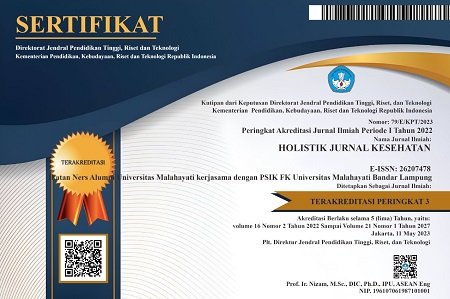Kejadian ikutan pasca imunisasi (KIPI) vaksin Covid-19
Abstract
Background: At the end of 2019, the world was shocked by the emergence of a new respiratory disease outbreak that was first reported from Wuhan, China, and spread to countries around the world. The World Health Organization, the World Health Organization (WHO), this disease was given the name Covid 19 and was designated as a Pandemic. Given this situation, one of the most likely ways to prevent the disease from spreading further is by vaccination.
Purpose:To find out the factors that cause Post Immunization Adverse Events (KIPI) for the Covid-19 vaccine in the Tapos and Pamulang Health Centers.
Method: The research design used is an analytical research type with a prospective cohort design. The study was conducted by monitoring respondents who were given the CoronaVac type of Covid-19 vaccine followed by Adverse Events after Immunization on the first day after the vaccine and the sixth day after the vaccine. The research was conducted in two places, namely Puskesmas Tapos Depok with a total of 329 respondents and Puskesmas Pamulang with a total of 491 respondents. The variables in this study were age, gender, history of infection with Covid-19, vaccine status, level of anxiety, and Post-Immunization Adverse Events (AEFI) the first day after the vaccine and the sixth day after the vaccine. The level of confidence in this is 95%.
Results: This shows that by age, the majority are adults, namely 26-45 years. Most of them are female, have no history of being infected with Covid-19. Types of AEFIs such as swelling at the injection site, itching, and diarrhea. The results of the bivariate analysis showed that there was no relationship between gender, history of Covid-19, vaccination status got, and anxiety with AEFI on the first day after the vaccine and AEFI on the sixth day after the vaccine. Monitoring of AEFIs on the sixth day after vaccination showed that a small proportion of respondents, namely 26 people, had mild AEFIs with most respondents, namely 464 people without AEFIs. However, on the 6th day of monitoring of AEFI, there was still 1 respondent who had a severe AEFI.
Conclusion: There is no relationship between gender, history of Covid-19 infection, vaccination status obtained with AEFI both the first day and the sixth day after the vaccine at the Tapos Health Center, Depok, West Java. However, there is a relationship between age and anxiety variables with AEFI on the sixth day after taking of the vaccine.
Keywords: Age; Gender; History of being infected with Covid-19; Vaccine Status; Anxiety Level, AEFI
Pendahuluan: Di penghujung tahun 2019, dunia dihebohkan dengan munculnya wabah penyakit pernapasan baru yang pertama kali dilaporkan dari Wuhan, China, dan menyebar ke negara-negara di seluruh dunia. Organisasi Kesehatan Dunia, Organisasi Kesehatan Dunia (WHO), penyakit ini diberi nama Covid 19 dan ditetapkan sebagai Pandemi. Melihat situasi ini, salah satu cara yang paling mungkin untuk mencegah penyebaran penyakit semakin luas adalah dengan vaksinasi.
Tujuan: Mengetahui faktor-faktor yang menyebabkan Kejadian Ikutan Pasca Imunisasi (KIPI) vaksin Covid-19 di Metode : Jenis penelitian analitik dengan rancangan kohort prospektif. Penelitian dilakukan dengan melakukan pemantauan terhadap responden yang diberikan suntik vaksin Covid-19 jenis CoronaVac diikuti Kejadian Ikutan Pasca Imunisasi pada hari pertama pasca vaksin dan hari ke enam pasca vaksin. Penelitian dilakukan di dua tempat yaitu Puskesmas Tapos Depok sejumlah 329 responden dan Puskesmas Pamulang sejumlah 491 responden. Variable dalam penelitian ini yaitu usia, jenis kelamin, riwayat terinfeksi Covid-19, status vaksin, tingkat kecemasan, dan Kejadian Ikutan Pasca Imunisasi (KIPI) hari pertama pasca vaksin dan hari ke-enam pasca vaksin. Tingkat kepercayaan dalam ini yaitu 95%.
Hasil: Didapatkan berdasarkan usia, mayoritas adalah orang dewasa yaitu 26-45 tahun. Kebanyakan dari mereka adalah perempuan, tidak memiliki riwayat terinfeksi Covid-19. Jenis KIPI seperti pembengkakan di tempat suntikan, gatal-gatal, dan diare. Hasil analisis bivariat menunjukkan bahwa tidak ada hubungan antara jenis kelamin, riwayat Covid-19, status vaksinasi yang didapat, dan kecemasan dengan KIPI hari pertama setelah vaksin dan KIPI hari keenam setelah vaksin.
Pemantauan KIPI pada hari keenam setelah vaksinasi menunjukkan sebagian kecil responden yaitu 26 orang mengalami KIPI ringan dengan sebagian besar responden yaitu 464 orang tanpa KIPI. Namun pada pemantauan hari ke-6 KIPI masih terdapat 1 responden yang mengalami KIPI berat.
Simpulan: Tidak ada hubungan antara jenis kelamin, riwayat infeksi covid-19, status vaksinasi yang didapat dengan KIPI baik hari pertama dan hari keenam setelah vaksin di Puskesmas Tapos Depok Jawa Barat. Namun yang ada hubungan pada variabel usia dan kecemasan dengan KIPI pada hari keenam setelah pemberian vaksin.
Keywords
References
Aldilawati, S., & Hidayat, R. (2021). Edukasi Vaksinasi Covid-19 dan Penerapan 5M Dalam Menanggulangi Penularan Covid-19 di Desa Borisallo Kabupaten Gowa. Idea Pengabdian Masyarakat, 1(02), 59-63.
Anwar, T. (2021). COVID19 Diagnosis using AutoML from 3D CT scans. In Proceedings of the IEEE/CVF International Conference on Computer Vision (pp. 503-507).
Basyir, V., Adnani, S. R., & Prima, N. (2021). Caeserean Delivery of Women with COVID-19 in Padang, Indonesia: A Case Report. Systematic Reviews in Pharmacy, 12(3), 698-700.
Badan Pengawas Obat dan Makanan - Republik Indonesia. (2010). Acuan sediaan herbal. Volume Kelima Edisi Pertama. Direktorat Obat Asli Indonesia.
Cable News Network (CNN) Indonesia. (2020). Mengenal Social Distancing sebagai Cara Mencegah Corona. CNN Indonesia. Diunduh dari https://www. cnnindonesia. com/gaya-hidup/20200314102823-255-483358/mengenal-social-distancing-sebagai-cara-mencegah-corona.
Dewi, S. A. E. (2021). Komunikasi Publik Terkait Vaksinasi Covid 19. Health Care: Jurnal Kesehatan, 10(1), 162-167.
Fatiha, F. J. A. A. A., Priyanka, T. J. M. C. B., & Ferdoush, M. J. (2020). The Impact of COVID-19 Pandemic on Undergraduate Medical Students of Bangladesh. Journal of Army Medical College Chattogram, 3(1), 5-9.
Gumantan, A., Mahfud, I., & Yuliandra, R. (2020). Tingkat kecemasan seseorang terhadap pemberlakuan new normal dan pengetahuan terhadap imunitas tubuh. Sport Science and Education Journal, 1(2).
Hafizzanovian, H., Oktariana, D., Apriansyah, M. A., & Yuniza, Y. (2021). Peluang Terjadinya Immunization Stress-Related Response (ISRR) selama Program Vaksinasi Covid-19. Jurnal Kedokteran dan Kesehatan: Publikasi Ilmiah Fakultas Kedokteran Universitas Sriwijaya, 8(3), 211-222.
Hayati, H., & Alifi, M. R. (2021). Analisis sentimen pada tweet terkait vaksin Covid-19 menggunakan metode support vector machine. JTT (Jurnal Teknologi Terapan), 7(2), 110-119.
Hornsey, M. J., Harris, E. A., & Fielding, K. S. (2018). The psychological roots of anti-vaccination attitudes: A 24-nation investigation. Health psychology, 37(4), 307.
Kementerian Kesehatan Republik Indonesia. (2020). Pusat data dan informasi Kementeriananan Kesehatan Republik Indonesia. Diakses dari: https://pusdatin.kemkes.go.id/resources/download/pusdatin/profil-kesehatan-indonesia/Profil-Kesehatan-indonesia-2020.pdf
Lidiana, E. H., Mustikasari, H., Pradana, K. A., & Permatasari, A. (2021). Gambaran karakteristik kejadian ikutan pasca vaksinasi Covid-19 pada tenaga kesehatan alumni Universitas ‘Aisyiyah Surakarta. Jurnal Ilmiah Kesehatan, 11(1), 11-17.
Manurung, E. P. (2021). Skripsi literature review: pengaruh senam hamil terhadap tingkat kecemasan pada ibu hamil.
Martini, S., Kusumawaty, I., & Yunike, Y. (2021). Persepsi Dan Kesiapan Lansia Menerima Vaksin Covid-19. Jurnal'Aisyiyah Medika, 6(2).
McMurtry, C. M. (2020). Artificial intelligence in public health: Managing immunization stress-related response: A contributor to sustaining trust in vaccines. Canada Communicable Disease Report, 46(6), 210.
Oktari, R. S., Detiro, M. D., & Rahman, S. (2021). How is COVID-19 perceived by medical students? A survey in Aceh province, Indonesia. Jàmbá: Journal of Disaster Risk Studies, 13(1).
Putri, C., Hariyanto, T. I., Hananto, J. E., Christian, K., Situmeang, R. F. V., & Kurniawan, A. (2021). Parkinson’s disease may worsen outcomes from coronavirus disease 2019 (COVID-19) pneumonia in hospitalized patients: A Systematic Review, Meta-Analysis, and Meta-Regression. Parkinsonism & Related Disorders.
Sumartiningtyas, H. K. (2020). Indonesia Menuju New Normal Corona, ini Protokol Kesehatan Covid 19 yang harus Dilakukan. Kompas. Com, 2.
Ula, S. H. (2021). Metaphor analysis on covid-19 vaccine issues in New York Time online news (Doctoral dissertation, Universitas Islam Negeri Maulana Malik Ibrahim).
World Health Organization. (2009). World health statistics 2009. World Health Organization.
Zhou, Q., Wei, X. S., Xiang, X., Wang, X., Wang, Z. H., Chen, V., & Fish, E. N. Interferon-A2b Treatment for COVID-19. medRxiv 2020, 2020.04. 06.20042580.
Zulva, T. N. I. (2020). Covid-19 Dan Kecenderungan Psikosomatis. J. Chem. Inf. Model, 2(1), 1-4.
DOI: https://doi.org/10.33024/hjk.v15i4.5498
Refbacks
- There are currently no refbacks.
Copyright (c) 2021 Holistik Jurnal Kesehatan

This work is licensed under a Creative Commons Attribution-NonCommercial 4.0 International License.














